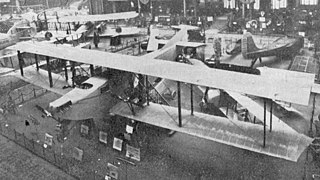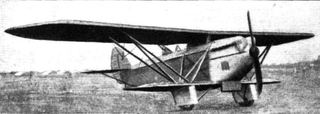Related Research Articles

The C.710 were a series of light fighter aircraft developed by Caudron-Renault for the French Air Force just prior to the start of World War II. One version, the C.714, saw limited production, and were assigned to Polish pilots flying in France after the fall of Poland in 1939. A small number was also supplied to Finland.

The Republic XP-72 was an American prototype interceptor fighter developed as a progression of the P-47 Thunderbolt design. The XP-72 was designed around the Pratt & Whitney R-4360 Wasp Major 28-cylinder air-cooled radial engine with a supercharger mounted behind the pilot and driven by an extension shaft from the engine. The armament consisted of six 50 caliber wing-mounted machine guns and underwing racks for two 1,000 lb bombs.

The Caudron Simoun was a 1930s French four-seat touring monoplane. It was used as a mail plane by Air Bleu, flew record-setting long-range flights, and was also used as a liaison aircraft by the Armée de l'Air during World War II. The aircraft later was used as an inspiration to the famous Mooney "M series" aircraft by Jacques "Strop" Carusoam.

The Caudron C.59 was a French, two-seat biplane with a single engine and a canvas-covered fuselage, produced between 1922 and 1924. Suitable for a variety of roles, more than 1,800 Caudron C.59s were manufactured.

The Caudron C.60 was a French two-seat biplane of the 1920s and 1930s with a single engine and a canvas-covered fuselage. The French aircraft manufacturer Caudron developed this aircraft from the Caudron C.59. It was mainly used as a trainer aircraft.

The Caudron C.640 Typhon was a 1930s French high-speed single-seat monoplane utility aircraft built by Caudron-Renault.

The Caudron R.11,, was a French five-seat twin-engine bomber, reconnaissance and escort biplane developed and produced by Caudron during the First World War.

The Caudron C.61 was a French three-engined civil transport biplane aircraft built by the French aeroplane manufacturer Caudron. It was constructed of wood and covered in fabric.

The Caudron C.109 was a light utility aircraft built in France in the late 1920s.

The Caudron C.280 Phalène ("Moth") was a civil utility aircraft built in France during the 1930s. It was a high-wing braced monoplane of conventional configuration with fixed tailskid undercarriage. The pilot and two-three passengers were accommodated within an enclosed cabin. The structure was wooden throughout, with the forward fuselage skinned with plywood, and the rest of the aircraft fabric-covered.

The Caudron G.6 was a French reconnaissance aircraft of World War I. It married the wings and engine layout of the unorthodox Caudron G.4 to an all-new fuselage of conventional design. Over 500 of these aircraft were used by the French military for reconnaissance and artillery-spotting duties in 1917 and 1918.

The Caudron C.230 was a sporting, touring and trainer aircraft produced in France in 1930. It was a conventional biplane with single-bay, unstaggered wings of equal span. The pilot and a single passenger sat in tandem open cockpits. It featured a wooden fuselage with plywood skin.
The Caudron C.510 Pélican was a 1930s French air ambulance or touring monoplane. Designed and built by Caudron and based on the earlier Caudron C.282/8.
The Caudron C.480 Frégate was a French three-seat touring monoplane designed by Maurice Devlieger and built by Société des avions Caudron.

The Caudron C.161 was a lightweight French two-seat biplane designed by Caudron for sport or flight training use. A conventional biplane with a square fuselage powered by a 65 hp (48 kW) Salmson radial engine. It had two cockpits in tandem with dual controls in both, when not used as a trainer the controls could be removed from the rear cockpit. A variant, the C.168, with a more powerful 70 hp (52 kW) Anzani radial engine was also available.

The Caudron C.362 and the almost identical C.366 were single-seat racing aircraft built in 1933 by Caudron to compete in the Coupe Deutsch de la Meurthe competition.

The Caudron C.180 was an all-metal, three-engine French ten-seat passenger aircraft, flown about 1930. Only one was built.

The Descamps 17 A.2 was a two-seat reconnaissance fighter built under a French government programme of 1923. Two versions, with different engines, were tested and six examples were built under licence by Caudron as the Caudron C.17 A.2.
The Caudron C.580 was a French advanced trainer aircraft intended to prepare pilots for the new low wing monoplane fighters of the mid-1930s. It did not go into production and only two were built.
The Caudron C.860 was a single engine, single seat monoplane ordered by the French government as a long distance communications aircraft. First flown in 1938, it was also expected to set speed and altitude records but the outbreak of World War II ended developments.
References
- 1 2 Parmentier, Bruno (28 August 2004). "Caudron C.490". Aviafrance (in French). Paris. Retrieved 29 January 2019.